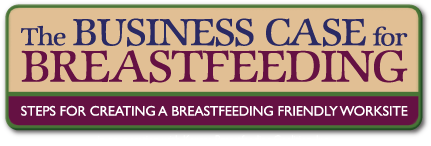
 |
 |
|
| For Employers Policy Example Room Guidelines Employer Awards Employer Support Links For Employees Federal Law Business Case Literature Videos |
 |
|
 |
 |
|
 |
||
785.477.4666 The Business Case for Breastfeeding is a national initiative of the U.S. Department of Health and Human Services, Health Resources and Services Administration’s Maternal and Child Health Bureau, and the HHS Office on Women’s Health. Kansas Breastfeeding Coalition is a partner in this national initiative |
||
For Employers - Nursing Policy Example
Policy for Supporting Breastfeeding Employees* - (Download Word Doc)
[Name of company] provides breastfeeding employees the following:Reasonable Time to Express Milk at Work
Employees shall be provided reasonable time to express milk while at work for up to three years
following the child’s birth each time the employee has need to express milk. Employees should
use usual break and meal periods for expressing milk, when possible. If additional time is needed
beyond the provided breaks, employees may use personal leave or may make up the time as
negotiated with their supervisors.
A Private Area for Milk Expression
Employees will be provided with a private place, other than a bathroom, that is shielded from
view and free from intrusion from co-workers and the public, to express breast milk. The room
can be a designated space for lactation. If this is not practical or possible, a vacant office,
conference room, or other small area can be used so long as it is not accessible or visible to the
public or other employees while the nursing employee is using the room to express milk. The
room will:
. Be in close proximity to the employee’s work station when possible
. Have a door equipped with a functional lock or, if this is not possible, the room will have a sign advising that the room or location is in use and not accessible to other employees or the public
. Be well lit
. Ensure privacy by covering any windows with a curtain, blind, or other covering
. Contain at a minimum a chair and a small table, counter, or other flat surface
. Ideally include an electrical outlet and nearby access to clean water
No employee shall be discriminated against for breastfeeding or expressing milk during the work period, and reasonable efforts will be made to assist employees in meeting their infant feeding goals while at work.
This policy shall be communicated to all current employees and included in new employee orientation training.
Any act found to be intentional that invades a nursing mother’s privacy shall be treated as a disciplinary offense and reported to the appropriate manager.
Employer Responsibilities
[Name of company] will:· Maintain the cleanliness of the room or location set aside for the use of employees expressing breast milk at work.
· Notify employees returning to work following the birth of a child of their rights under this policy. This notice may either be provided individually to affected employees or to all employees generally through posting in a central location.
Employee Responsibilities
Breastfeeding employees utilizing lactation support services will:· Give supervisors advance notice of the need for lactation accommodations, preferably prior to their return to work following the birth of the child. This will allow supervisors the opportunity to establish a location and work out scheduling issues.
· Maintain the designated area by wiping the pump (if provided) and surfaces with microbial wipes so the area is clean for the next user.
· Insure the safekeeping of expressed breast milk stored in any refrigerator on the premises. Breast milk can be stored in a general company refrigerator, in a refrigerator provided in the lactation room, or in the employee’s personal cooler.
*This policy has been adapted from the “Making it Work: For Employers”, part of the Making it Work Tool Kitt from the New York State Department of Health and the New York State WIC.
Alternate Policy**
In recognition of the well documented health advantages of nursing for infants and mothers, [name of company] provides a supportive environment to enable nursing employees to express their milk during work hours. This includes a company-wide nursing support program administered by
[name of department].
[Name of company] subscribes to the following worksite support policy. This policy shall be communicated to all current employees and included in new employee orientation training.
Company Responsibilities
Nursing employees who choose to continue providing their milk for their infants after returning to work shall receive:
Milk Expression Breaks
Nursing employees are allowed to nurse or express milk during work hours using their normal breaks and meal times. For time that may be needed beyond the usual break times, employees may use personal leave or may make up the time as negotiated with their supervisors.
A Place to Express Milk
A private room (not a toilet stall or restroom) shall be available for employees to nurse or express milk. The room will be private and sanitary, located near a sink with running water for washing hands and rinsing out breast pump parts, and have an electrical outlet. If employees prefer, they may also nurse or express milk in their own private offices, or in other comfortable locations agreed upon in consultation with the employee’s supervisor. Expressed milk can be stored [in general company refrigerators/in designated refrigerators provided in the nursing employee's room or other location/in employee’s personal cooler].
Nursing Equipment
[Name of company] [provides/subsidizes/rents] electric breast pumps to assist nursing employees with milk expression during work hours. The company provides [hospital grade pump that can be used by more than one employee/or portable personal use electric breast pump that the employee retains] throughout the course of nursing for the employee. [If using a standard hospital-grade pump, indicate whether the company provides/subsidizes personal attachment kit or where the employee can purchase the kit.] [Indicate whether breast pumps are also available for partners of male employees.]
Education
Prenatal and postpartum nursing classes and informational materials are available for all mothers and fathers, as well as their partners.
Staff Support
Supervisors are responsible for alerting pregnant and nursing employees about the company’s nursing employees support program, and for negotiating policies and practices that will help facilitate each employee’s infant feeding goals. It is expected that all employees will assist in providing a positive atmosphere of support for nursing employees. [List other components specific to your company’s program]
Employee Responsibilities
Communication with Supervisors
Employees who wish to express milk during the work period shall keep supervisors informed of their needs so that appropriate accommodations can be made to satisfy the needs of both the employee and the company.
Maintenance of Milk Expression Areas
Nursing employees are responsible for keeping milk expression areas clean, using anti-microbial wipes to clean the pump and area around it. Employees are also responsible for keeping the general nursing room clean for the next user. This responsibility extends to both designated milk expression areas, as well as other areas where expressing milk will occur.
Milk Storage
Employees should label all milk expressed with their name and date collected so it is not inadvertently confused with another employee’s milk. Each employee is responsible for proper storage of her milk using [company provided refrigerator/personal storage coolers].
Use of Break Times to Express Milk
When more than one nursing employee needs to use the designated lactation room, employees can use the sign-in log provided in the room to negotiate milk expression times that are most convenient or best meet
their needs.
** Policy included adapted from The Business Case for Breastfeeding, published by the U.S. Department of Health and Human Services, Health Resources and Services Administration’s Maternal and Child Health Bureau.